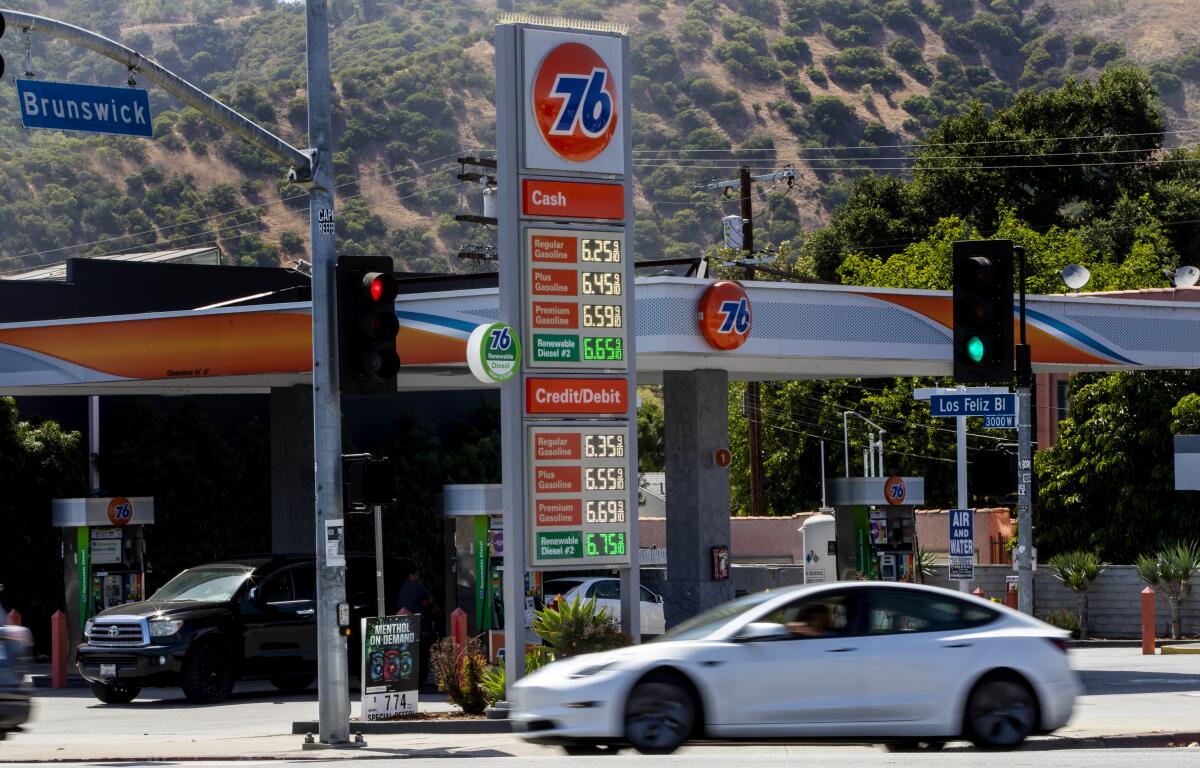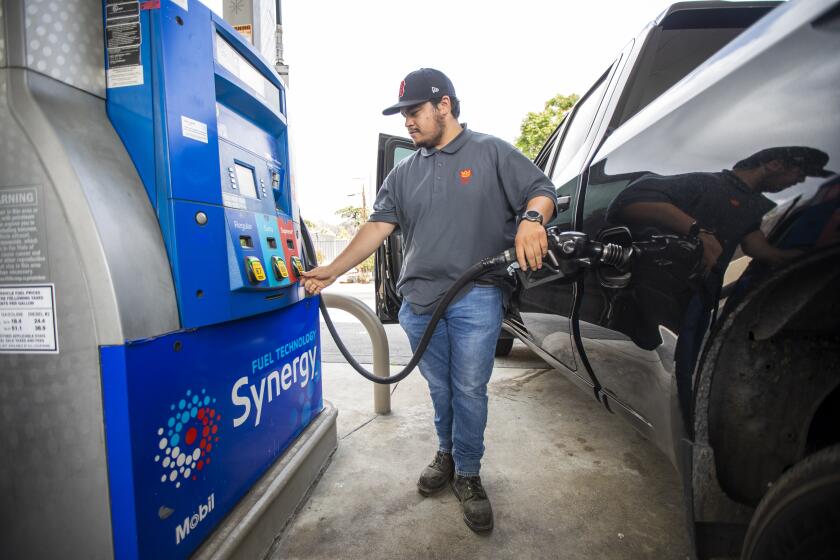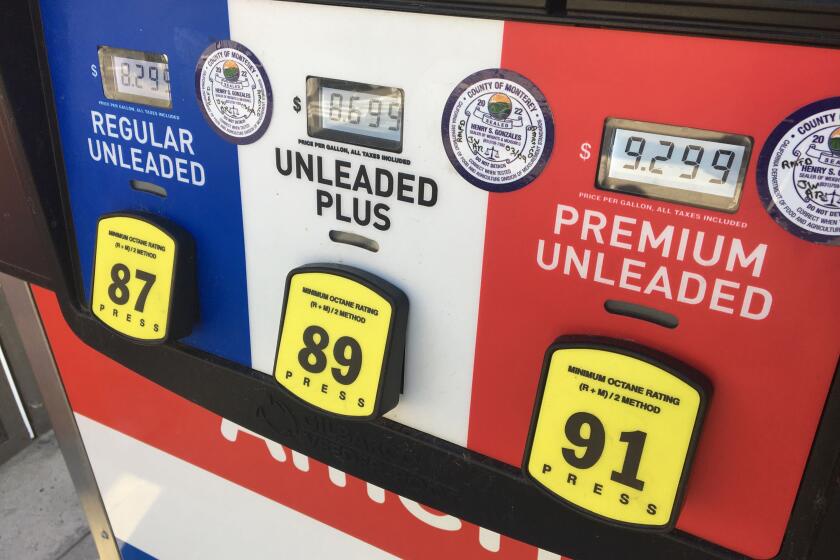Pausing the gas tax would have been great for Democrats. Instead we got a July 4 price increase

SACRAMENTO — A gas tax break would have been nice as Californians hit the road over the July 4th weekend. Instead, they were smacked with a tax increase.
That’s the sort of thing we’ve learned to expect from one-party rule and a liberal state government in Sacramento. There’s just no bipartisan give-and-take.
If Republicans had any clout in the state Capitol, there probably would have been a negotiated tax deal that lowered gas prices at the pump.
But the California GOP has become so weak it no longer gets invited to the bargaining table. With supermajority control, Democratic legislators can pass anything they want without Republican votes.
The only big-time bargaining between politicians in Sacramento is among Democrats — liberal lawmakers and liberal Gov. Gavin Newsom. And sure enough, the result is almost always liberal.
The gas tax hike that landed Friday was only about 3 cents per gallon — minuscule compared with the statewide average pump price of $6.25. But it was in the wrong direction.
The little bump represented an automatic annual increase that “indexes” the tax to inflation. The total per-gallon excise tax rose from roughly 51 cents to about 54 cents.
The Legislature and then-Gov. Jerry Brown set that up in 2017 when they raised the tax significantly. Republicans tried to repeal it, but voters retained the tax and with it the yearly hike.
Lawmakers could have suspended the increase and, for that matter, the entire excise tax. But the Legislature’s liberal leadership balked.
To his credit, Newsom did propose pausing the tax hike for one year. But he gave in during negotiations.
Republicans, sensing a marketable campaign issue, have been clamoring for a “gas tax holiday,” arguing the entire 54-cent levy should be suspended for up to a year.
Not just Republicans, but President Biden. He recently asked Congress to cancel the 18-cents-per-gallon federal gasoline tax for three months. And he urged states to suspend their own levies.
Naturally, in this polarized era, congressional Republicans were opposed to what a Democratic president wanted.
“This is a transparently partisan political stunt and a fundamentally bad idea,” Rep. Tom Cole (R-Okla.) said.
Gas prices in California will go up about 3 cents on July 1 due to the state’s excise tax on gasoline, which is adjusted each year.
But in Sacramento, Republicans have the opposite view — probably in large part because it’s Democrats here who oppose the tax holiday.
“President Biden understands the value of suspending the gas tax, yet Sacramento Democrats and this governor are tone deaf to their party’s leader and our pain at the pump,” state Senate Republican Leader Scott Wilk of Saugus asserted in a statement Friday.
Sacramento Democrats claim suspending the gas tax is wrongheaded for three reasons:
— The money is needed for road improvements and repairs. The tax generates $7.7 billion a year.
— There’s no guarantee the tax cut wouldn’t just be pocketed by oil companies and pump prices would never be lowered.
— Poor people who don’t own cars wouldn’t benefit.
The first argument is bogus. Budget writers last week projected a revenue surplus approaching $100 billion. There are barrels of money to replenish the highway fund without collecting gas taxes.
There’s legitimate concern, however, that oil companies would rip off the tax benefit. Distributors pay the tax and add the cost to what they charge stations for filling their underground tanks. The stations then add it to the pump price.
“The benefit from the tax cut could be siphoned off upstream before it flows to the consumer at the pump,” says H.D. Palmer, spokesman for the state Department of Finance.
OK, but New York and other states have suspended the gas tax and haven’t had a significant problem with oil company rip-offs. You’d hope that California could be on top of gas distribution and punish a greedy company that gouged motorists.
As for poor people not owning cars, well, that means they aren’t being hurt by high gas prices either.
Newsom originally proposed giving $750 million to public transit agencies so they could help poor people by offering free rides for three months.
What will I get from California’s $9.5 billion gas tax relief plan? What you need to know
He also proposed suspending the sales tax on diesel fuel for a year — and secured that in the final agreement. It’ll cost the state $439 million.
Why suspend the sales tax on diesel but not on gas? It’s part of a pro-business package. The aim is to lower fuel costs for truckers who haul products to stores. Theoretically that will also reduce the cost of consumer goods.
Newsom proposed sending every car owner $400 — $800 max for more than one vehicle — but legislators steered away from aiding only motorists. They wanted to help with inflationary price hikes on all consumer products, such as groceries, not just gas.
The governor and lawmakers agreed on a $9.5-billion benefit package they’re calling a “tax refund.” Roughly 95% of income tax filers will benefit, thanks to Newsom.
Individuals earning up to $250,000 and couples making up to $500,000 will get something. Legislators wanted to deny benefits to people earning half that much — providing nothing for filers with incomes exceeding $125,000 and $250,000 respectively.
Benefits will range from as little as $200 for individuals with large incomes to $1,050 for couples with children who earn under $150,000.
But checks aren’t in the mail. The money won’t begin arriving until October, just before the politicians stand for reelection. Deliveries won’t be completed until January.
Actually, I think most of the state benefit money should have been spent on needed infrastructure: water facilities, wildfire prevention, homeless shelters.
That said, a gas tax suspension would have been excellent PR for Democrats and diluted a Republican campaign issue.
Imagine the goodwill generated by a dramatic 50-cent-per-gallon drop in pump prices over the holiday weekend — rather than a finger-in-the-eye 3-cent boost.
More to Read
Sign up for Essential California
The most important California stories and recommendations in your inbox every morning.
You may occasionally receive promotional content from the Los Angeles Times.













